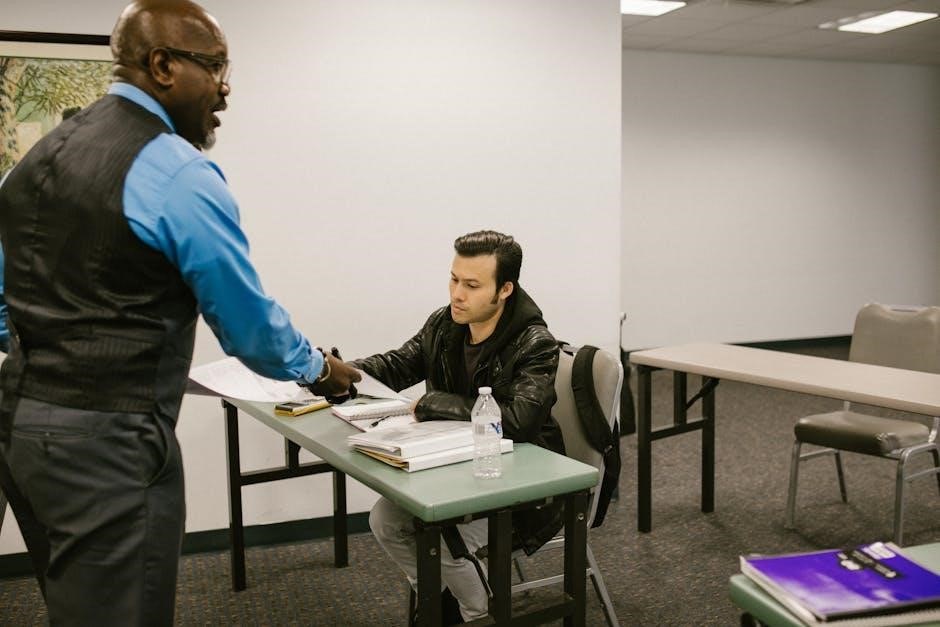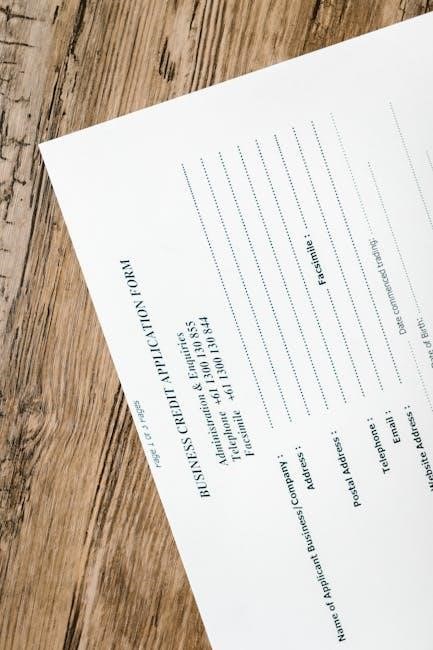mo-pte instructions

Missouri Pass-Through Entity (PTE) Tax: An Overview
For tax years ending on or after December 31, 2022, Missouri partnerships and S corporations can elect to pay pass-through entity (PTE) tax. This allows qualifying members to claim a credit for taxes paid.
What is the Missouri PTE Tax?
The Missouri Pass-Through Entity (PTE) tax is an elective tax that allows qualifying partnerships and S corporations to pay income tax at the entity level, rather than at the individual owner level. This is a workaround for the federal State and Local Tax (SALT) deduction limit of $10,000. By electing to pay the PTE tax, the business can deduct the state income tax paid on its federal income tax return, effectively bypassing the SALT limitation. This election is available for tax years ending on or after December 31, 2022, and must be made annually when filing Form MO-PTE. The goal is to provide a federal tax benefit to the owners.

Eligibility and Election for MO-PTE
Missouri partnerships and S corporations can elect to pay PTE tax for tax years ending on or after December 31, 2022. This election offers a workaround for the federal SALT deduction limit.
Who Can Elect to Pay PTE Tax?
In Missouri, partnerships and S corporations have the option to elect to pay the Pass-Through Entity (PTE) tax. This election is available for tax years ending on or after December 31, 2022. By making this election, these entities can pay income tax at the entity level, potentially providing a workaround for the federal limit on state and local tax (SALT) deductions for their members. This option is designed to benefit qualifying members by allowing them to claim a credit for the taxes paid by the entity on their individual income tax returns, effectively reducing their overall tax liability. The election aims to mitigate the impact of the SALT limitation;
Annual Election and Irrevocability
The election to pay Missouri’s Pass-Through Entity (PTE) tax is made annually, providing flexibility for partnerships and S corporations. Each year, eligible entities can assess their tax situation and decide whether electing PTE tax is advantageous. This election must be made when filing Form MO-PTE. Once the election is made for a specific tax year, it is irrevocable for that year. This means that after the entity makes the election and files its return, it cannot change its mind and revoke the election for that tax year. Therefore, careful consideration is essential before making the election. The election’s irrevocability emphasizes the importance of planning.

Filing Form MO-PTE
To make the pass-through entity tax election, businesses must file Form MO-PTE by the 15th day of the fourth month after the end of the fiscal year to report their income.
MO-PTE Filing Deadline
Pass-through entity income tax returns are due on or before the 15th day of the fourth month following the end of the tax year. For example, if the taxable period is January 1, 2024, to December 31, 2024, the return is due April 15, 2025. To make the pass-through entity tax election, businesses must file Form MO-PTE by this deadline. The company will use the same MO-PTE form to report their income for the tax year. It’s crucial to adhere to this timeline to ensure compliance and avoid any potential penalties.
Extension of Time for Payment
If an affected business entity is approved for a filing extension of the affected business entity tax return (Form MO-PTE), the entity is likewise granted an equal extension of time for the payment of the tax due. This extension aligns with section 143.436, RSMo. It’s important to note that while the filing deadline may be extended, interest may still accrue on any unpaid tax from the original due date. Therefore, it is advisable to pay as much as possible by the original deadline to minimize potential interest charges, even with an approved extension.

MO-PTE Tax Benefits
Paying the tax at the entity level allows the business to deduct the state income tax paid, circumventing the $10,000 SALT limit on the federal Form 1040 Schedule A.
Federal Deduction and SALT Limit
The primary advantage of the Missouri PTE tax election lies in its ability to circumvent the federal state and local tax (SALT) deduction limit of $10,000. By paying state income tax at the entity level, businesses can deduct this tax as an ordinary business expense, effectively reducing their federal taxable income. This mechanism allows pass-through entities to bypass the individual SALT limitation imposed on Schedule A of Form 1040. The election is available for tax years ending on or after December 31, 2022. Therefore, this arrangement translates to a potentially significant reduction in overall tax liability for the owners or members of these entities.
Impact of Missouri H.B. 1912
Missouri House Bill 1912, signed into law on July 9th, introduces key modifications to the pass-through entity tax landscape. The bill allows members of a PTE to opt out of the entity’s PTE tax election, instead paying state income tax individually. Furthermore, H.B. 1912 enables entity members to claim the business income deduction, permitting a deduction of up to 20% of qualified business income. This legislative change provides greater flexibility to PTE members, allowing them to choose the tax strategy most beneficial to their individual circumstances. It provides options for those who the PTE election may not benefit.
MO-PTE Payment Information
To realize the benefit on the owners 2024 personal tax return, it is recommended that an anticipated Missouri tax payment be made by the entity before Dec. 31.
Making Anticipated Payments
To realize the benefit for the owners’ 2024 personal tax return, it is recommended that an anticipated Missouri tax payment be made by the entity before December 31st. This anticipated 2024 payment would be treated as a prepayment on the 2024 MO-PTE form when filed. Advanced payment vouchers for next year’s PTET can be produced using the ES system. This allows the business to deduct the state income tax paid rather than subjecting it to the $10,000 SALT limit.
A check, money order, or cashier’s check may be mailed with the voucher. This can be a strategic way to manage tax liabilities.
Opt-Out Election
Missouri H.B. 1912 modifies the PTE tax credit, allowing members to opt out of the entity’s election. Attach Federal K-1 for each opt-out member. Members can then pay state income tax individually.
Member’s Right to Opt-Out
Missouri H.B. 1912, signed into law July 9, significantly modifies the pass-through entity tax credit. This modification allows members to proactively opt out of an entity’s PTE election. Instead of participating in the PTE tax structure, members can elect to pay their state income tax independently. The entity must attach a Federal K-1 for each member making the opt-out election. This provides flexibility, allowing members to claim the business income deduction; Specifically, they can subtract up to 20 percent of their qualified business income, potentially reducing their individual tax liability based on their specific financial circumstances and tax planning strategies.

Resources and Assistance
The Missouri Department of Revenue offers resources regarding motor vehicle, driver licensing, taxation, and collection services. Tax professionals can get assistance from MOCPAs and Deloitte for guidance on PTE challenges.
Missouri Department of Revenue Contact Information
For inquiries regarding the Missouri Pass-Through Entity (PTE) tax, taxpayers can contact the Missouri Department of Revenue. The department can be reached by mail at P.O. Box 3080, Jefferson City, MO 65105-3080. For phone assistance, taxpayers can call (573) 751-4541. The department also provides a fax number for certain communications: (573) 522-1721. Additionally, taxpayers can explore the Missouri Department of Revenue’s website for online resources and information regarding PTE tax and other relevant tax matters. The website offers details on services and benefits available to eligible taxpayers, including military personnel. For specific guidance on PTE tax calculation and filing requirements, taxpayers can refer to the department’s regulations outlined in 560-7-3-.03.
Guidance from Professionals and Associations
Navigating the complexities of the Missouri Pass-Through Entity (PTE) tax can be challenging. Seeking guidance from qualified professionals and associations is highly recommended. Certified Public Accountants (CPAs) possess the expertise to provide tailored advice and assistance with PTE tax filings. Organizations like the Missouri Society of Certified Public Accountants (MOCPA) offer resources and support to their members, fostering collaboration and knowledge sharing. Furthermore, consulting with tax advisors from reputable firms such as Deloitte can provide valuable insights and ensure compliance with state regulations. These professionals stay abreast of legislative changes, like H.B. 1912, and can help businesses optimize their tax strategies. For additional support, consider consulting resources like Tax Notes and the Bradford Tax Institute.
Leave a Reply
You must be logged in to post a comment.